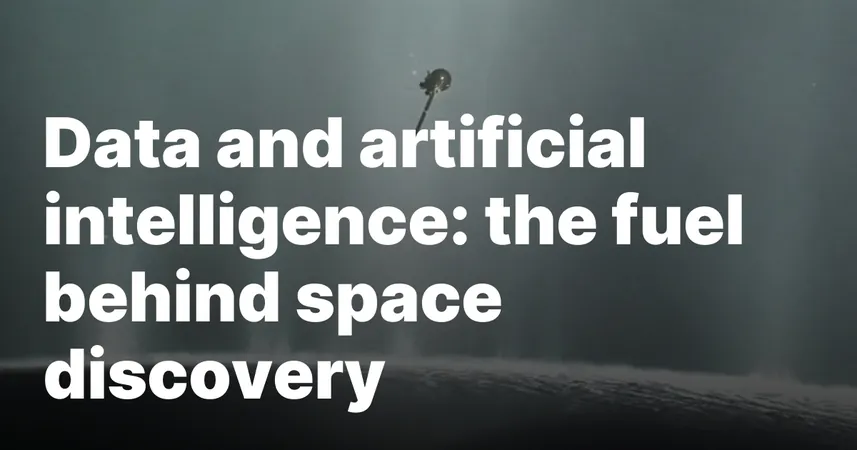
Unraveling the Cosmos: How Data and AI are Revolutionizing Space Exploration
2025-03-26
Author: Daniel
Unraveling the Cosmos: How Data and AI are Revolutionizing Space Exploration
As the United States strives to maintain its leadership in space exploration, entities like the U.S. Space Force and NASA are prioritizing this domain not just for scientific inquiry, but also for national security. The quest for data dominance is at the forefront of these efforts, with artificial intelligence (AI) playing a pivotal role in enhancing the capabilities of space missions.
Harnessing AI for Real-Time Decision Making
Integrating advanced AI tools such as machine learning (ML) algorithms is crucial for making real-time decisions in space. These technologies enable spacecraft to perform engineering analyses and conduct opportunistic science measurements, ultimately optimizing available resources. By prioritizing data for Earth transmission and identifying critical patterns on the fly, AI offers a pathway to improve the effectiveness of space missions significantly.
Imagine a spacecraft designed to autonomously assess its surroundings, make decisions, and steer its exploration goals without waiting for instructions from Earth. Such a capability could be transformative. For instance, on a mission to Saturn’s moon Enceladus, a spacecraft could analyze data from icy plumes and redirect its focus on other intriguing targets in real time, leveraging onboard AI to guide its actions.
The Challenges of a Data-Driven Approach
However, implementing AI-enhanced spacecraft faces several hurdles. The limited computing power on board, constrained by power and weight limitations, complicates the deployment of sophisticated AI systems. Moreover, the harsh environment of space necessitates stringent "space-proofing," including radiation shielding and thermal control, which can increase both complexity and costs.
Communication remains another significant challenge, with bandwidth limitations and the potential for lost signals when planetary targets are out of direct line of sight. This introduces a level of uncertainty in AI-driven decisions, especially in critical missions like life detection.
A Collaborative Future for Space Exploration
To overcome these challenges, the space industry must embrace collaboration with the private sector, fostering innovative approaches and solutions. Partnerships, such as the one between NASA and IBM, aim to accelerate the development of AI processors designed for the unique demands of space. A focus on building robust data processing pipelines and intelligent data collection systems will enable mission teams to operate with near-real-time insights, optimizing mission-critical operations.
As algorithms are trained and refined on Earth, they can be adapted for specific mission scenarios, paving the way for applications such as anomaly detection and hardware failure prediction. This symbiotic relationship between big data and AI not only enhances spacecraft capabilities but also empowers scientists on the ground by providing advanced visualization and simulation tools.
The Path Toward a Data-Driven Cosmos
Looking ahead, the key to unlocking the next frontier of space exploration will lie in fostering a data-driven environment. This entails interdisciplinary collaboration among AI experts, software engineers, and astrobiologists to develop adaptable and scalable tools. As on-board computing capabilities evolve, the prospect of performing complex data analyses in situ becomes increasingly feasible.
The dream of harnessing the power of AI in space isn’t just about advanced technologies; it's also about igniting a new era of science discovery and exploration. The integration of AI and data analytics into space missions heralds a future where real-time insights lead to unprecedented discoveries, boldly pushing the boundaries of human knowledge about the universe.
In conclusion, as we venture deeper into our solar system and beyond, the marriage of advanced data analytics and artificial intelligence might just be the key that unlocks the cosmos, leading us to discoveries we have yet to imagine. The countdown to this data-driven revolution in space has already begun!


 Brasil (PT)
Brasil (PT)
 Canada (EN)
Canada (EN)
 Chile (ES)
Chile (ES)
 Česko (CS)
Česko (CS)
 대한민국 (KO)
대한민국 (KO)
 España (ES)
España (ES)
 France (FR)
France (FR)
 Hong Kong (EN)
Hong Kong (EN)
 Italia (IT)
Italia (IT)
 日本 (JA)
日本 (JA)
 Magyarország (HU)
Magyarország (HU)
 Norge (NO)
Norge (NO)
 Polska (PL)
Polska (PL)
 Schweiz (DE)
Schweiz (DE)
 Singapore (EN)
Singapore (EN)
 Sverige (SV)
Sverige (SV)
 Suomi (FI)
Suomi (FI)
 Türkiye (TR)
Türkiye (TR)
 الإمارات العربية المتحدة (AR)
الإمارات العربية المتحدة (AR)